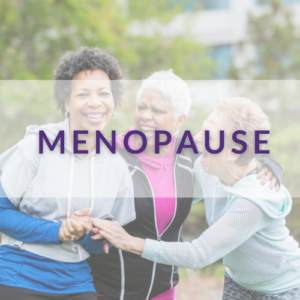Menopause

Menopause is the time in a woman’s life when she naturally stops having menstrual periods. A woman is in menopause once she goes 12 months or more without having a period. The average age of menopause is 51.4 years old. “Perimenopause” defines the years prior to menopause and can be characterized by irregular menstrual cycles, hot flashes, night sweats, sleep disturbances, and changes to your vaginal and urinary tract. Due to the lack of estrogen, women are at higher risk for osteoporosis and cardiovascular disease after reaching menopause.
Menstrual Cycle Changes
During your childbearing years, monthly changes in two hormones–estrogen and progesterone–control your menstrual cycle. Beginning in your 30’s and 40’s, the ovaries make less estrogen. A common sign of perimenopause is a change in your menstrual cycle. Cycles may become longer or shorter. They may space out (skip periods). They may become lighter or heavier. Although changes to your menstrual cycle are normal in the perimenopause years, you should still report them to your provider. Abnormal bleeding may be a sign of a problem. Let your provider know if you are experiencing anything of the following
- Bleeding in between periods
- Bleeding after sex
- Spotting at any time in the menstrual cycle
- Bleeding that is heavier or lasts for more days than usual
- Any bleeding after menopause
Hot Flashes and Night Sweats
Hot flashes are a common symptom of perimenopause. They are described as sudden feelings of heat that rush to the upper body and face. The skin can become red and flush with sweat. They may last for a few seconds to several minutes or hours. They are not harmful but can become disruptive and interfere with daily activities. When hot flashes occur at night these are called night sweats and can cause sleep disturbances.
Vaginal and Urinary Changes
The vaginal lining gets thinner, dryer, and less elastic as estrogen levels decrease during menopause. Vaginal atrophy is the term used to describe this condition and it can lead to painful intercourse and more frequent vaginal and urinary tract infections.
Menopause is a natural event, but the symptoms can be very bothersome and even disruptive to daily life. Please speak to your provider for more information and to receive advice on lifestyle modifications, medications, and treatments that can help cope with this time of transition.